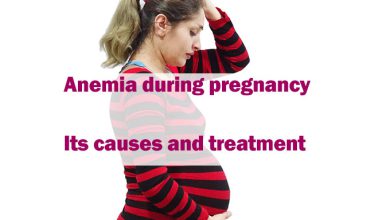Constipation during pregnancy and its causes and treatment
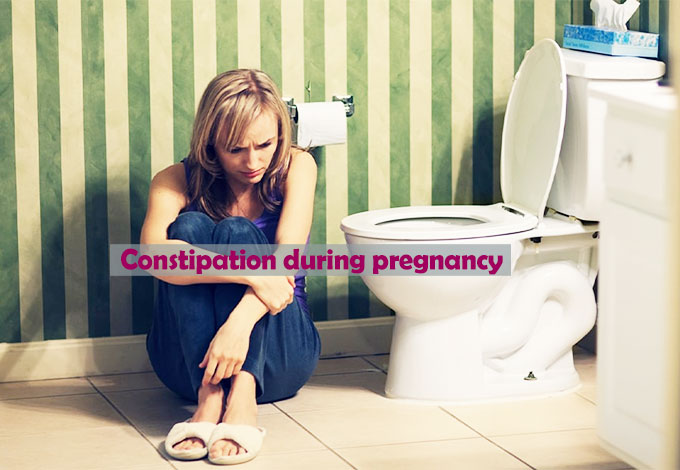
Basically, the normal functioning of the intestine varies from person to person. Constipation means having a bowel movement less than 3 times a week and persistent hard stools.
If you suffer from constipation, you may find it difficult or painful to pass stool, and you may need to strain. Some people with constipation feel like they have not completely emptied their bowels, even after defecating, and they need to have more bowel movements.
According to statistics, 1 out of 4 women suffers from constipation during pregnancy. Fortunately, this problem usually resolves itself as the pregnancy progresses. Since mothers cannot use laxatives or laxatives on their own during pregnancy, it is best to prevent this problem by consuming liquids, fruits, and vegetables.
If you experience constipation during pregnancy, it can be easily resolved with home remedies. In the rest of this article, we will mention the causes of this complication and the different ways to treat it.
Related posts: Diarrhea During Pregnancy
What is the symptom of constipation in pregnancy?
The appearance of this problem can be a sign of a low-fiber diet, side effects of multivitamin drugs, hormonal changes during pregnancy, etc. Constipation usually occurs in early pregnancy and resolves by stabilizing the level of hormones and changing the mother’s diet.
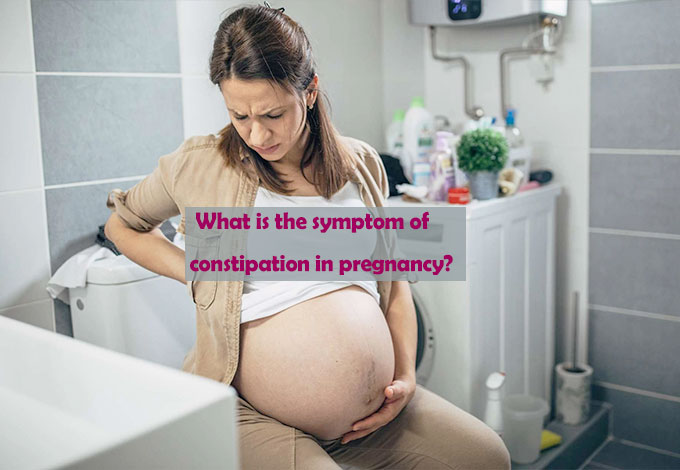
Doctors believe that low levels of dietary fiber in the diet can contribute to constipation during pregnancy. However, there are other factors that can cause constipation in pregnancy. Possible causes include the following:
-
Hormones:
The change in hormone levels in the body and the increase in progesterone hormone in early pregnancy slows down the movement of stool in the large intestine. This problem is effective in increasing the amount of water that the large intestine absorbs from the stool, leading to constipation in pregnancy, hard stools, and straining during bowel movements.
-
Multivitamins:
Generally, prenatal vitamins are high in iron and calcium. Iron is an important mineral that is sometimes deficient during pregnancy. Continued consumption of iron minerals can cause constipation and hard, black stools.
-
Medications during pregnancy:
Prescription drugs to control nausea and vomiting, antacids to relieve reflux or heartburn, and some strong pain relievers can cause constipation in some women. If you take any of these medications while pregnant and develop constipation, talk to your doctor about whether changing your medication or supplement might help.
-
The pressure of the uterus on the intestines:
During pregnancy, the uterus is constantly expanding to accommodate the weight gain of the fetus. This can put pressure on the intestines and make it difficult for stool to pass through the intestines. For this reason, constipation is more common in twin or multiple pregnancies.
Studies have shown that women who experience chronic constipation before pregnancy are more likely to experience worse symptoms during pregnancy.
If you are planning to get pregnant in this situation, try changing your lifestyle before pregnancy. Eating a healthy diet, drinking plenty of fluids, and getting regular exercise can help you maintain regular bowel movements.
While constipation in pregnancy is often not a sign of illness, in rare cases it can be caused by a serious condition, such as a tumor or colon cancer. If you are concerned and notice blood in your stools, talk to your ob-gyn or gastroenterologist.
Complications of constipation in pregnancy
If you are pregnant, you don’t have to worry about constipation affecting your baby. Because the complications of the mother’s intestinal discomfort are not transferred to the baby. In most cases, constipation during pregnancy is short-lived and resolves with little or no treatment. However, in rare cases, long-term constipation can cause stool retention, which may require a doctor to remove the stool.
If these conditions are not controlled, there is a possibility of bloating, stomach pain, anal fissures, hemorrhoids (hemorrhoids), or rectal prolapse. Therefore, constipation in pregnancy is dangerous and must be treated. Fortunately, constipation during pregnancy can be treated quickly today.
Of course, continuous use of laxatives can slow down the colon and make the condition worse. These drugs can also cause electrolyte imbalances in some people.
This problem often affects people who also have other health problems, such as diabetes or kidney disease. It’s better to talk to your doctor about the types of laxatives and how often you use them.
What is the treatment for constipation in pregnancy?
Surely this uncertainty has formed in your mind what should I eat for constipation during pregnancy? Is there a need for drug treatment? We suggest that you change your lifestyle instead of taking chemical drugs.
If it is not possible to treat constipation during pregnancy with home methods, safe laxatives can be used under the supervision of a doctor. Of course, using laxatives can sometimes lead to side effects like abdominal pain and diarrhea during pregnancy.
Effective home remedies for constipation during pregnancy
Experience has shown that the simultaneous use of the following safe methods is very useful in the definitive treatment of constipation in pregnancy:
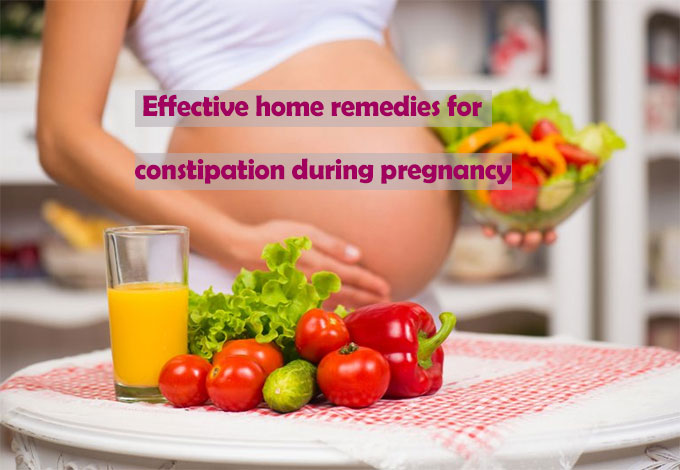
-
Increasing the amount of dietary fiber:
In response to the question, what should we eat for the immediate treatment of constipation? It can be argued that taking fiber supplements or increasing the intake of fiber-rich foods such as fruits, vegetables, bran-containing foods, and whole grains can make it easier for stool to pass through the intestines.
It’s worth mentioning that adults should consume between 28 and 34 grams of dietary fiber per day. Consuming very fatty foods such as fast food, very sweet foods, soft drinks, and alcohol can aggravate constipation.
-
Increase fluid intake:
Drinking enough water is important to keep stools soft and easy to pass. If you feel that drinking lots of water isn’t helping you, you can add light soups, teas, and fruit or vegetable juices to your diet.
-
Increase daily activity:
Being active is effective in moving stool faster in the large intestine. Therefore, regular exercise with a doctor’s approval can help relieve constipation. If you can’t exercise, especially in the later months of pregnancy, try taking an easy walk every day.
-
Consumption of probiotics:
Millions of beneficial bacteria live in the large intestine and help it function properly. Probiotics, in fact, contain these bacteria and their consumption increases normal and regular bowel movements. Probiotic-rich foods include yogurt, cheese, and buttermilk. Today, probiotic supplements are available in pill or powder form.
Medical Methods for the rapid treatment of Constipation in Pregnancy
If the above home remedies do not work, it may be time to discuss other options with your OB-GYN. For women who take vitamins that contain iron during pregnancy, doctors may recommend taking vitamins that contain less iron.
The main medical treatment for constipation in pregnancy is a medicine called a laxative, which makes going to the bathroom easier and more comfortable.
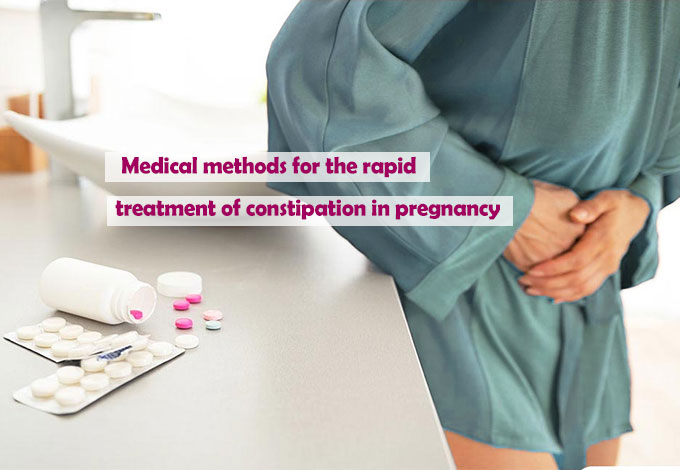
Although most laxatives are not well absorbed into the bloodstream and can be taken during pregnancy and breastfeeding, always consult your pharmacist or doctor before taking any medication while pregnant.
Studies have shown that there is no problem in treating constipation in pregnancy with the following suppositories, pills, or powders:
-
Bulking laxatives:
Medications such as psyllium powder, methylcellulose, and polycarbophil can greatly help your stool absorb more water. As a result, the stools become larger and softer and can be passed more quickly and easily. Dietary fiber also has exactly that mechanism.
-
Lubricating laxatives:
Drugs that add a slippery coating to stool, can help stool pass more easily. A Glycerin suppository is one type of lubricating laxative.
-
Osmotic laxatives:
In addition to reabsorbing more body water in the intestines to soften stools, these drugs are also effective in stimulating greater contraction of the intestines for faster stool removal. Excessive use of osmotic laxatives can cause abdominal cramps and bloating. Its types include polyethylene glycol and magnesium hydroxide.
It should be noted that various types of constipation pills during pregnancy can cause uterine contractions in some women. For this reason, be sure to consult your doctor regarding the use of the mentioned drugs.
Treatment of constipation in the traditional medicine of pregnancy.
Traditional medicine has interesting methods of treating constipation in the first three months of pregnancy and beyond. Things like:
- Treatment of constipation in pregnancy with olive oil
- Treatment of constipation in pregnancy with figs
- Treatment of constipation in pregnancy with khaki.
Olive oil is a kind of natural lubricating laxative that facilitates its release by creating an oily layer around the stool. Like plums, figs are high in dietary fiber and can make the stool bulky and soft by absorbing water.
Khakshir and basil seeds are one of the best natural osmotic laxatives that can ease the passage of stool by reabsorbing more body water in the intestines and stimulating the contraction of intestinal muscles.
When should we see a doctor?
Constipation is uncomfortable during pregnancy. Taking into account that the mother suffers from other side effects such as morning sickness, increased subcutaneous water or edema, etc. Basically, if you experience the following symptoms, you should go to a 4gynecologist or gastroenterologist:
- Nausea
- Stomach ache
- Vomit
- Constipation lasting more than 1 or 2 weeks
- Bleeding from the anus and rectum
- Uselessness of laxatives
What is the best treatment for constipation in pregnancy?
Keep in mind that pregnancy constipation can often be prevented with lifestyle changes. For example :
- Drink plenty of fluids
- Include physical activity in your daily routine
- Include more fiber in your diet
What is the main cause of constipation during pregnancy?
What hormone causes constipation in pregnancy?
Conclusion
In conclusion, constipation is a common problem experienced by many women during pregnancy. It is primarily caused by hormonal changes and the physical pressure exerted by the growing fetus on the intestines. Additionally, factors such as a low-fiber diet, insufficient water intake, and a sedentary lifestyle can exacerbate the condition.
The treatment for constipation during pregnancy includes lifestyle modifications such as increasing fiber intake, drinking plenty of water, and engaging in regular physical activity. Additionally, over-the-counter laxatives and stool softeners can be used to alleviate symptoms. However, pregnant women should always consult with their healthcare provider before taking any medication.
In summary, constipation during pregnancy can be uncomfortable, but it is usually not a serious medical condition. By making simple lifestyle changes and using safe and effective treatments, pregnant women can manage their symptoms and improve their overall health and well-being.
